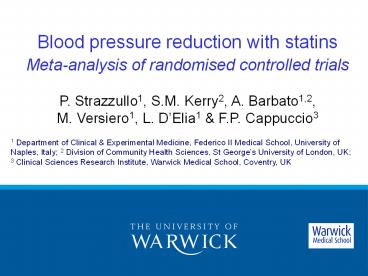Blood pressure reduction with statins - PowerPoint PPT Presentation
1 / 16
Title:
Blood pressure reduction with statins
Description:
Title: Slide 1 Author: Sharon McGladrigan Last modified by: Alex Created Date: 4/21/2005 2:20:53 PM Document presentation format: On-screen Show Company – PowerPoint PPT presentation
Number of Views:65
Avg rating:3.0/5.0
Title: Blood pressure reduction with statins
1
Blood pressure reduction with statins Meta-analysi
s of randomised controlled trials P.
Strazzullo1, S.M. Kerry2, A. Barbato1,2, M.
Versiero1, L. DElia1 F.P. Cappuccio3 1
Department of Clinical Experimental Medicine,
Federico II Medical School, University of Naples,
Italy 2 Division of Community Health Sciences,
St Georges University of London, UK 3 Clinical
Sciences Research Institute, Warwick Medical
School, Coventry, UK
2
Conflict of Interest
- FPC has received honoraria and refund of expenses
from Pfizer
3
Background
- Possible anti-HPT effect of statins investigated
by very few studies in patients with HPT and
hypercholesterolemia. - Additional information from several other
studies, not specifically aimed at the evaluation
of the statins anti-HPT effect. - Present knowledge hampered by severe limitations
(inadequate design, small sample size, too short
Rx period, modification of concomitant anti-HPT
Rx during the trial). - Nevertheless, effect of statins on BP plausible
given their impact on endothelial function,
interaction with RAS and influence on large
artery compliance.
4
Objectives
- To carry out a systematic review of the
literature to identify all studies reporting BP
data during treatment with statins. - To carry out a meta-analysis of the effect of
statins on BP including all trials which met
strict predefined inclusion criteria.
5
Design and Methods
- Meta-analysis of randomised controlled trials
comparing statins vs placebo (or control) - Medline (1966 to Oct 2005), Embase (1980 to Oct
2005), Databases (Cochrane, Clinical
Effectiveness, HTA, NHS Economic Evaluation,
TRIP, CRD, AHRQ) identified 175 trials.
6
Flow Diagram
RCTs identified (n175)
RCTs retrieved (n156)
RCTs suitable (n20)
No control group (n19)
BP treatment not constant (n26) Incomplete
data (n97) Other (n13)
RCTs included (n20)
Placebo-controlled (n20) High TC pts (n19)
High BP pts (n11)
Pravastatin (n8) Simvastatin (n6)
Fluvastatin (n3) Atorvastatin, Cerivastatin
(n2) Lovastatin (n1)
7
Design and Methods
- Meta-analysis of randomised controlled trials
comparing statins vs placebo (or control) - Medline (1966 to Jan 2003), Embase (1980 to Jan
2003), Databases (Cochrane, Clinical
Effectiveness, HTA, NHS Economic Evaluation,
TRIP, CRD, AHRQ) identified 175 potential trials - Outcome measures difference in SBP and DBP
between patients taking statins and those taking
placebo (or control Rx) - 889 patients studied (324 on statins, 303 on
Control, 262 in cross-over trials, age 41-70 yrs)
- Duration from 4 weeks to 1 year
8
Statistical Analysis
- Random effects model
- Difference in BP (95 CI)
- Publication bias by funnel plot and Eggers test
- Trim and fill method
- Heterogeneity by chi-square
- Meta-regression to assess the possible
association of the BP effect of statin with age,
baseline BP, duration, HPT status, T2D, TChol
response to statin
9
Effect of Statins on Systolic BP
Heterogeneity plt0.01
10
Effect of Statins on Diastolic BP
Heterogeneity plt0.01
11
Funnel plots for systolic and diastolic BP
12
Effect of Statins on Systolic BP in studies with
average baseline BP gt130 mmHg
Heterogeneity p0.26
13
Effect of Statins on Diastolic BP in studies with
average baseline BP gt80 mmHg
Heterogeneity p0.069
14
Meta-regression of intervention effect on
systolic and diastolic BP
15
Limitations
- Small n of studies, small total sample size.
- Much larger studies not included to avoid
potential bias of BP treatment (e.g. WOSCOPS,
ASCOT, ALLHAT, etc) - Between-studies heterogeneity.
- Most studies NOT specifically designed to
evaluate the effect of statins on BP. - Most studies carried out in hypercholesterolemic
patients. - Publication bias impossible to rule out
completely. - Intra-class differences not discernible.
16
Summary and Conclusions
- Small but statistically significant effect of
statins on BP, more prominent on systolic BP - Effect greater in those with higher baseline BP,
BUT unrelated to age, duration of treatment, BP
Rx, T2D and cholesterol response, - Class effect difficult to detect
- Possible mechanisms increased NO
bioavailability, reduced ET1 production, improved
endothelial function, inhibition of ROS
production, reduction in large arteries
stiffness, improved systemic arterial compliance,
down-regulation of AII type 1 receptor and
reduced vasoconstrictor response to AII. - Potential importance for controlling high BP in
patients with CV co-morbidities































